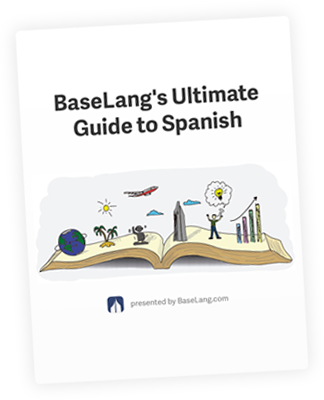Escuchar vs Oír in Spanish: What is the Difference?

Get our free email course, Shortcut to Conversational.
Have conversations faster, understand people when they speak fast, and other tested tips to learn faster.
More infoEscuchar vs Oír – what is the difference between both Spanish verbs? Can you use them interchangeably?
This is something that many Spanish students tend to ask.
Let’s see both verbs in action:
- te escucho pero no te entiendo – I listen to you but I don’t understand you
- te oigo pero no te veo – I hear you but I don’t see you
As you can see, both verbs are translated slightly differently but are still very similar, which is why Escuchar vs Oír is a common point of confusion for Spanish students.
In this post, we’ll explain the exact difference between both of these verbs, as we’ve done before with:
- Ver vs Mirar
- Recordar vs Acordarse
- Pedir v Ordenar
- Encontrar v Encontrarse
- Tener vs Haber
- Traer v Llevar
- Saber v Conocer
Now, back to our original topic – Escuchar vs Oír
The first thing you should know is that the main difference between both verbs is the intention with how the action is being performed.
Escuchar is used to express the action “to listen” which is something we do intentionally, since it requires a concentrated, mental or physical effort.
- Our teacher should be prepared to listen to different points of view of his students. – Nuestro profesor debería estar preparado para escuchar los diferentes puntos de vista de sus estudiantes.
- We listened to the whole explanation of the Communicative Approach for our final test – Escuchamos toda la explicación del Enfoque Comunicativo para nuestro examen final.
Oír is used to express the action “to hear”, something we have no control over. Like when you are driving, and suddenly hear a car honking its horn.
- Daniela heard something squealing in the basement – Daniela oyó algo chillando en el sótano
- I heard a horrible noise near my room – Oí un ruido horrible cerca de mi habitación
So in basic terms, to avoid confusing both verbs, you need to remember escuchar as “to listen” and oír as “to hear”.
Still confused?
Don’t worry, the truth is that (depending on the context) both verbs can be used interchangeably.
Let’s look at both verbs in action along with some examples.
Spanish Verb: Escuchar
Just to reiterate, this one is more intentional since it means “to listen to”, whether you are talking about listening to a person, music or something else.
- I listen to the radio while driving – Escucho la radio mientras manejo
- The students listen to the explanations from their teacher. – Los estudiantes escuchan las explicaciones de su profesor.
- Listen to your parents and do as they say. – Escucha a tus padres y haz lo que dicen.
- Did you listen to what the doctor said? No more coffee for you! – ¿Escuchaste lo que dijo el doctor? ¡No más café para ti!
Spanish Verb: Oír
This means “to hear”, and refers to the sensory act of hearing.
- I heard a big explosion – Oí una fuerte explosión.
- I can’t hear anything with my brand new telephone. – No puedo oír nada con mi nuevo teléfono.
- They hear the birds singing. – Ellos oyen el canto de los pájaros.
- It’s possible to hear the cars arriving from this part of the house. – Es posible oír los carros que llegan desde esta parte de la casa.
Escuchar vs Oír: When Are Both Interchangeable?
Don’t worry if you sometimes mix these verbs up, as the verbs can be used interchangeably, in a certain context.
Let’s some examples:
| English translation | Escuchar (to listen) | Oír (to hear) |
| I am listening to the radio. | Estoy escuchando la radio | Estoy oyendo la radio. |
| She could hear the kids playing outside. | Ella podía escuchar a los niños jugando en la playa. | Ella podía oír a los niños jugando en la playa. |
| She heard/listened to the pleas of her friend | Oyó las súplicas de su amigo. | Escuchó las súplicas de su amigo. |
One last thing to mention.
Oír is commonly used as an equivalent for “hey” in certain scenarios.
- Hey, kid! Come here! – ¡Oye, niño! ¡Ven aquí!
- Hey, you! What do you think you’re doing? – ¡Oiga, usted! ¿Qué cree que hace?
- Hey! I don’t think that’s a good idea! – ¡Oye/Oigan! No creo que sea buena idea.
Escuchar vs Oír: Exercises
Read the following statements and choose the correct option.
1. ¿Me estás (escuchando – oyendo)? Parece que estás pensando en otra cosa.
2. Ayer (oí – escuché) un ruido en la calle pero no le presté atención.
3. Acabo de (escuchar – oír) un podcast muy interesante. ¡Te lo recomiendo!
4. Todos estaban (escuchando – oyendo) la historia muy concentrados.
5. ¿Me (escuchas – oyes)? ¡Hay mucho ruido en la habitación!
6. ¿Has (escuchado – oído) lo último que le ha pasado a Elena?
7. No (escuché – oí) nada, estaba (escuchando – oyendo) música con los audífonos.
8. He (escuchado – oído) que el nuevo jefe va a llegar muy pronto.
9. (Escuchamos – Oímos) el golpe pero no le dimos mucha importancia.
10. Tienes que (escuchar – oír) más a tu profesor.
Answers
1. Escuchando
2. Oí
3. Escuchar
4. Escuchando
5. Oyes
6. Oído
7. Oí / Escuchando
8. Oído
9. Oímos
10. Escuchar



